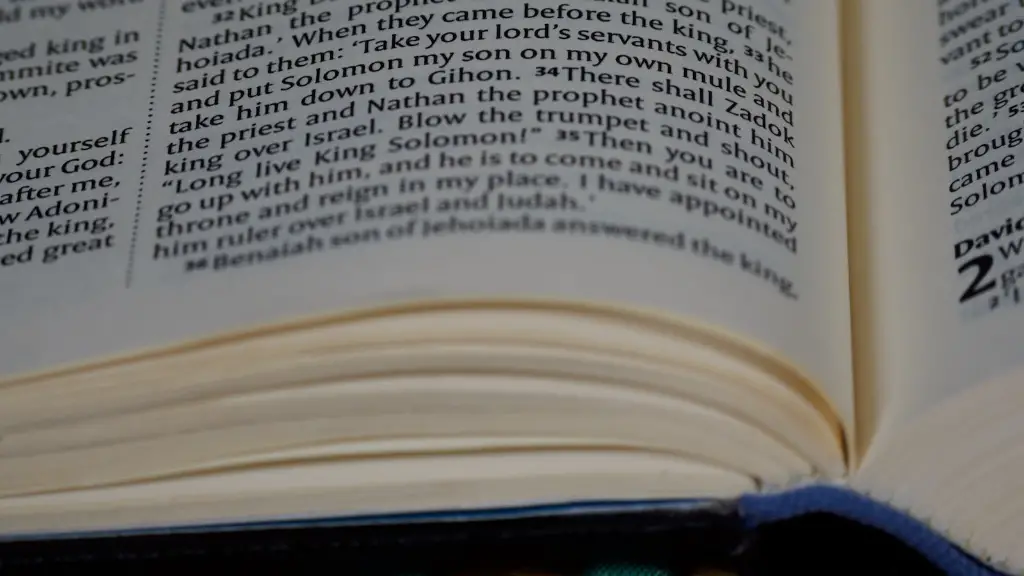Unicorns in the Bible is a topic that has been debated for centuries. While many believe that unicorns were real animals, some experts contend that they were based on mythological creatures. The truth is that the Bible does not contain explicit references to unicorns. In fact, the Hebrew Bible, or Old Testament, does not contain the word unicorn anywhere.
In modern English translations, the word unicorn appears in nine passages of the Bible. In all nine cases, it is a translation of the Hebrew word re’em, which means “wild ox”, or possibly “wild bull”. In older English translations, the word is translated into English as “unicorn”. Scholars generally agree that the re’em, or “unicorn” of the Bible, is not the mythical creature we commonly think it is, but rather an animal that is know to us today.
In the Bible, unicorns are likened to horses or bulls when they are mentioned. For example, in Psalm 22:21, God is referred to as “the strength of the unicorn.” In Job 39:9-10, the unicorn is said to be untamable and proud like a warhorse. In these passages and others, the unicorn is usually personified, rather than being seen as an actual creature.
There is also evidence that unicorns existed in the ancient world. The ancient Greeks, for example, believed in the existence of a single-horned creature, which they called a monokeros. The Romans went further and identified the monokeros with a wild bull. There are also depictions of unicorns on ancient coins from Persia and elsewhere in the world.
So, while the Bible does not explicitly mention unicorns, there is evidence that unicorns existed in the ancient world and were likely known to the authors of the Bible. Whether these creatures were actually the modern-day mythical animal or a real animal that has been since extinct is up for debate.
Biblical Interpretation
It is important to keep in mind that the Bible is a book written by different authors in vastly different contexts. So it is important to understand what the authors meant when they wrote specific passages, rather than taking a literal interpretation of the text.
The authors of the Bible likely used the word unicorn as a metaphor, or a symbol of power. The authors were trying to evoke feelings of awe and grandeur in the reader and thus chose to describe God or certain people as having the might of a unicorn. This is why the word unicorn appears in many contexts that have nothing to do with an actual creature.
For example, in Isaiah 34:7, unicorns are compared to lions. This comparison has nothing to do with a real animal, but rather is symbolic of power and strength. In other passages, such as Deuteronomy 33:17 and Numbers 23:22, God is described as having strength and power like that of a unicorn. Again, the authors are using the symbol of a unicorn to express a powerful idea.
So the question of whether unicorns exist in the Bible goes beyond a simple yes or no answer. While the Bible does not explicitly mention unicorns, there is evidence that the authors of the Bible were familiar with the concept of unicorns and used them as metaphors to express powerful spiritual truths.
Mythological or Real Animal?
The truth is, we simply don’t know what the authors of the Bible were thinking or implying when they used the word unicorn. Some experts argue that unicorns were real animals that have since become extinct. Others argue that they were mythical creatures that were widely accepted in the ancient world. The fact is, we simply don’t know for sure.
What we do know, however, is that unicorns have been used in literature, art, and mythology for centuries. The creature has had cultural and symbolic significance and continues to be used today to evoke feelings of mystery and awe.
So, while the Bible may not contain explicit references to unicorns, it is clear that unicorns were a part of the cultural landscape during the period in which the Bible was written. And, whether unicorns were real animals or mythological creatures, it is clear that the authors of the Bible understood the significance of the creature and used it to their advantage.
Unicorns in Popular Culture
Today, unicorns are more popular than ever, appearing in movies and books, and even as cuddly toys. But this popularity is a relatively recent phenomenon. In the past, unicorns have been seen as symbols of purity and innocence, which made them particularly popular with Christian artists.
Nowadays, unicorns are seen as symbols of magic and whimsy, and even as a way to express and explore fantasy. This has been particularly true in the fantasy and children’s literature genres. The Harry Potter, Twilight, and Narnia series are just a few of the works that use unicorns to explore magical and mythical worlds.
And, of course, unicorns also feature heavily in video games. From the hugely popular World of Warcraft to the beloved Mists of Pandaria, unicorns are everywhere in the world of gaming.
In short, unicorns have gone through a dramatic transformation in recent years, from symbols of purity and innocence to symbols of fantasy and whimsy. The creature is now an integral part of popular culture, and there is no sign of the trend slowing down anytime soon.
The Role of Unicorns in Modern Society
Unicorns have become so popular in recent years that there is a whole industry that has sprung up around the creatures. From t-shirts to mugs to backpacks, unicorns are everywhere. There are also websites and social media accounts dedicated to the creatures.
The popularity of unicorns has even made its way into the world of beauty, with some companies offering unicorn-themed makeup, hair care, and skin care products. And, of course, there are the ubiquitous unicorn drinks that can be found in cafes and supermarkets around the world.
This trend extends to wedding decorations and gifts, as well as to books, art, and toys. And, of course, there is the ever-growing market of unicorn-themed clothing, which has become particularly popular with children and teenagers.
In short, unicorns have become a part of everyday life in modern society. But while the creature has been embraced by modern society, it is still important to remember its roots in mythology and the Bible, and to appreciate its mysterious and powerful significance.
Psychology of Unicorns
It is not surprising that unicorns have taken on such a prominent place in modern culture. After all, the creatures evoke strong emotions in people of all ages. For some, Unicorns represent innocence, purity, and magic. For others, they represent strength, power, and courage.
Regardless of one’s perspective, unicorns have the power to inspire, to evoke feelings of awe and wonder, and to bring some much-needed levity and lightness to a sometimes confusing and chaotic world.
Many psychologists believe that the unicorn is a powerful symbol that taps into our deepest desires and our subconscious yearnings. It is no wonder then, that the creature has been embraced by so many people in modern society.
In the end, whether or not unicorns exist in the Bible is a matter of debate. But one thing is certain, unicorns are powerful symbols that evoke strong emotions and offer us a much-needed escape from the everyday chaos of modern life.





